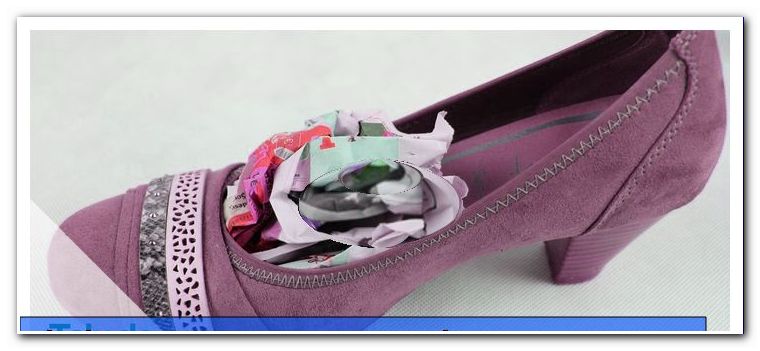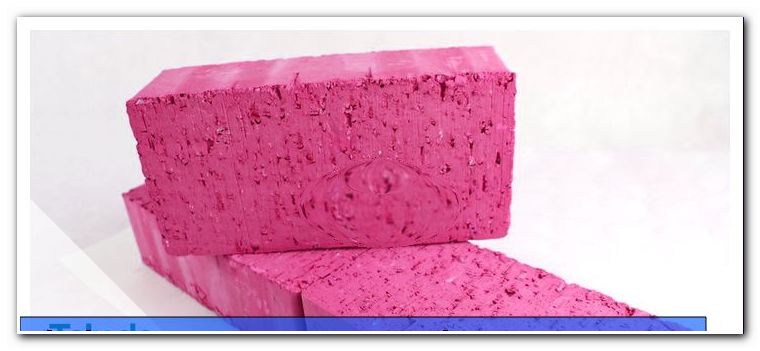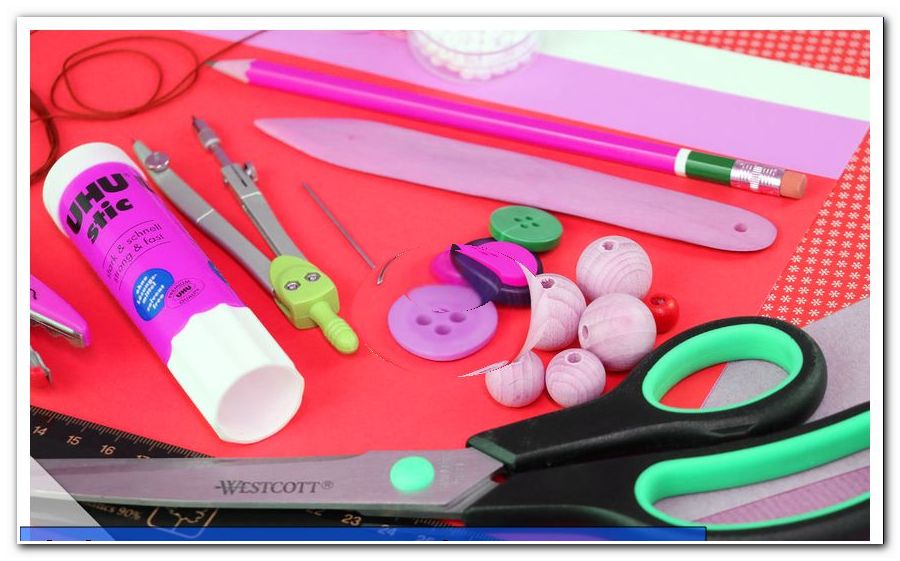Clean plastic garden furniture: the best 10 home remedies with instructions

- 10 home remedies presented
- Clean with water
- Vinegar and dishwashing liquid
- toothpaste
- laundry detergent
- All Purpose cleaner
- Radierschwamm
- Putzstein
- Soda or baking soda
- Cockpit Care
- Lemons
- Regular care
If the garden furniture is often used during the summer, buried under snow during the winter, or stowed away in the garden shed for a long time, cleaning the seating is recommended. Plastic garden furniture requires completely different care than wood or metal, and appropriate home remedies are available that are precisely tailored to the needs of the plastic.
Plastic furniture has the great advantage that they are lightweight and durable and can be built in the garden within a short time. In addition, they are protected against rotting, even if they must last for a long time in humid weather conditions. However, a big problem with garden furniture is their susceptibility to dirt of any kind. Depending on the color of the furniture, dirt can be detected very quickly and can only be effectively removed by appropriate cleaning measures. You do not have to resort to aggressive cleaners. The use of classic home remedies is more useful with these furniture and ideally you even have them at home.
10 home remedies presented
The home remedies are a variety of products that you use in everyday life and are extremely well suited for the cleaning of plastic furniture. Plastic is extremely durable, but does not tolerate any form of oil or oily solvent, as they dissolve the plastic more and more and make it brittle. The following home remedies are recommended:
- water
- Vinegar and dishwashing liquid
- toothpaste
- washing powder
- All Purpose cleaner
- Radierschwamm
- Putzstein
- Soda or baking soda
- Cockpit Care
- Lemons

With these home remedies, even large garden furniture can be quickly and effectively cleaned, as they can be produced and used in sufficient quantities. In addition, all these products are quite cheap, as they can be found in almost every supermarket or drugstore.
Tip: Many online forums say that products like olive oil or body lotion work wonders here. However, this is only for a few days, because over time, the plastic is fragile and vulnerable to the weather and therefore, these funds are not recommended.
Clean with water
In many cases, cleaning with water for the garden furniture is completely sufficient. This is especially recommended for furniture that has just become freshly dirty, for example, by playing children in the garden, who sit on the chairs with muddy shoes. Since fresh dirt takes a long time to stick to the plastic, you can take your time, but it is never wrong to carry out the work immediately. Here's how to do it:
- choose either the pressure washer or garden hose
- Position the piece of furniture slightly away from delicate objects
- fix the furniture either by hand or by foot, not necessarily at tables
- Do not use too much water pressure to avoid damaging the plastic
- It is recommended on hot days, as dry soil can be poured over here at the same time
- Thoroughly clean the entire piece of furniture to remove the dirt
- then dry the garden furniture carefully to prevent further stains
- Cost: water bill
If you use a high pressure washer, you should not use the highest level here because plastic can still break. For stubborn stains, however, the device works wonders and easily puts the garden hose in the shade. Of course, water always offers a quick solution for plastic, but this method works best with fresh dirt.
Vinegar and dishwashing liquid
Vinegar is extremely effective against all forms of stains and dirt. The vinegar essence is highly concentrated enough to effectively remove stains, even those that have been in effect for a long time. However, the concentration is not too high to attack the plastic and thus damage the garden furniture. For the home remedy you only need vinegar essence and a gentle dishwashing detergent so that your chairs, tables or chairs do not stink of vinegar afterwards. Proceed as follows:
- put on gloves, the vinegar mixture could burn on the skin
- Mix the vinegar essence in the ratio of 1: 5 with water
- treat all the furniture or single stains
- let the medium work for a while
- then rinse with a detergent solution
- Finally, rinse the furniture with clear water
- Dry the garden furniture
- Cost: under 5 euros
Vinegar can be used very well with conventional dirt. If the stains are too persistent, but must be put on something stronger, since vinegar can not handle all stains alone. As a pretreatment, the natural remedy shines in every form.
toothpaste
Toothpaste is perfectly suitable as a cleaning agent due to the substances it contains. It contains various bleaches that help against all sorts of dirt on the teeth and have this effect on the surface of the garden furniture. Particularly efficient here are so-called "continuing toothpastes" or those with xylitol oil, which have a strong effect on dirt and rub it out of the surfaces. The instruction:
- mix the toothpaste with water to a paste
- use either a microfiber cloth or a soft sponge and rub the paste in the dirt
- Go here very carefully to catch all filthy spots
- Then wash the furniture with water
- dry off the plastic furniture
- Cost: 2 - 3 euros

Do not use toothpaste that has extra beads in it, as this could rub off the surface. Although plastic may be resistant to a variety of external influences, but these beads are not recommended. They act like a scrub, which is just not good for the surface, which could scratch it. Also: do not use toothbrushes!
laundry detergent
Detergent works in a similar way to toothpaste, but less should be used as most of the commercially available detergents can be quite aggressive. If you want to be on the safe side, you should use laundry detergents from the organic shop, as it is gentler on surfaces and also on clothing. This is applied like the toothpaste and here you have to pay particular attention to the mixing, so that no globules or lumps remain. Cost: 2 - 3 euros.
All Purpose cleaner
The good old all-purpose cleaner. This remedy can also be used for dirty or dusty garden furniture, as the cleaning effect is based on an acid, which is perfect for the plastic. When choosing the cleaner, make sure that it is environmentally friendly. Since many garden furniture can be quite large, the cheapest cleaner would indeed work here, but the exhalations of the cleaner are not responsible for the plants and animal inhabitants of the garden. Here also the way to the organic store would be recommended. Follow the procedure below:
- Place the garden furniture on a tarpaulin
- either spray the entire piece of furniture or use a sponge and rub off the furniture
- let the cleaner interact a little
- Rinse with water or remove with kitchen towels
- Cost: 3 - 5 euros
Radierschwamm
Erasers can be effectively used for quick dry cleaning, especially when stubborn stains on the surfaces present. Eraser sponges are particularly gentle on the plastic and ensure that the surface does not scratch, which would be a pity, especially with expensive furniture. The home remedy works like an eraser and does not require any form of cleaning agent, which makes it easy to use. You only need to rub over the stains to remove them. In addition, they can be used in conjunction with a microfiber cloth well against dust and dirt. These are available in the drugstore. Cost: about 5 euros.

Putzstein
The plaster stone is used in a similar way as the eraser sponge and uses natural substances that have a cleansing and at the same time polishing effect. Your garden furniture shines here again in new splendor, which makes the plaster stones so appealing in use. Simply rub the dirt with these stones and then use the other side to polish the plastic. Also available at the drugstore. Cost: 8 - 10 euros.
Soda or baking soda
As with many devices, the two propellants soda and baking soda can also be used for cleaning plastic. Simply use conventional variants of these agents and dose as follows:
- slight soiling: a packet into the cleaning water
- heavy soiling: make paste and rub over a cloth
Then rinse the garden furniture again and you will be amazed at how effective the funds are. Cost: under 1 Euro.
Cockpit Care
The classic cockpit care for the car is suitable for all forms of plastic, only takes a bit until the furniture can be used again afterwards. The smell is not necessarily so pleasant, but the cleaning performance is better. Apply the product either as a spray directly or as a liquid over a cloth and polish the furniture with a soft sponge. This care should only be applied to black furniture. Cost: 10 to 17 euros.
Lemons
With conventional lemons or lemon juice, you can effectively clean plastic garden furniture. Due to the acid contained, dust and light stains are attacked and removed. You can either halve lemons, squeeze them or buy pre-pressed juice. Then treat the stains directly over the halves of the lemon or work the juice over a sponge or cloth. Then wipe with damp microfibre cloths. Cost: less than 2 euros.
Regular care
You can prevent potential staining by providing regular care that only takes a few moments of your time. As each plastic attracts dust, it can settle, which in turn causes problems with dirt and stains. The dust acts here as a kind of bridge, which makes it easier for the dirt to literally eat into the material. To prevent this problem, you should regularly wipe the furniture with a damp microfiber cloth.
Prevent stains
Plastic can be exposed to a variety of environmental conditions and should never be stored outside during frosty weather, otherwise cracks could form. The most common causes of stains and dirt is the constant use by humans. You can save a lot of work by doing the following things during the summer. You should also not try to clean the furniture with these means:
- Sun and body lotions ensure brittle and stained furniture
- Cooking oil is also not recommended
- abrasive
- Cleaning agents containing solvents
- steel wool
- scouring pads
- knife
Also algae spots are a common problem with garden furniture, as they are for a long time outdoors and can collect a lot of moisture. This then evaporates and remains yellowish to greenish patches, which are often difficult to remove from the material.




